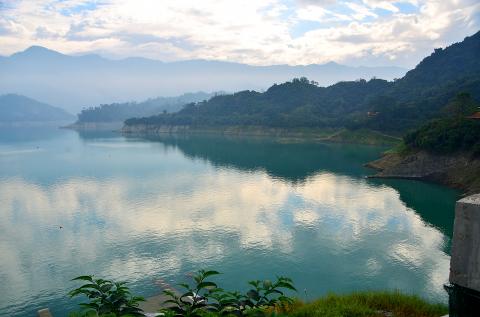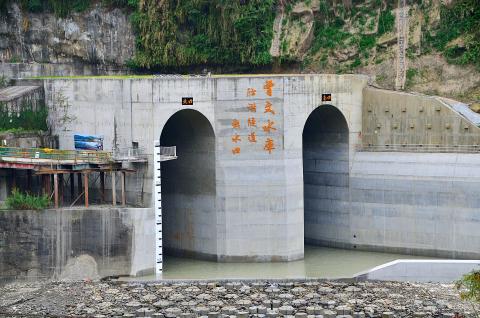Premier William Lai (賴清德) yesterday promised to ensure stable water supply for all sectors of the economy and encouraged businesses to invest in Taiwan as he presided over a ceremony to mark the completion of a major dredging system for the Zengwen Reservoir (曾文水庫).
The holding capacity of the reservoir, which spans Chiayi County and Tainan, has been dramatically reduced in recent years by about 100 million cubic meters, or about one-sixth of its capacity, due to a build-up of sludge and sediment.
Typhoon Morakot in 2009 alone contributed 90 million cubic meters of mud, which prompted the government to design a dredging system to remove the sludge from the nation’s largest reservoir.

Photo: Wu Chun-feng, Taipei Times
Construction of the NT$4.1 billion (US$141 million at the current exchange rate) system began in March 2013.
A 1.26km underground tunnel system was built across the hill on the left bank of the dam to the downstream Zengwen River (曾文溪) to transport bottom sediment from of the reservoir to downstream areas.
The nation’s largest water resource construction project in years, it is considered an engineering feat, as it was carried out without a cofferdam enclosure.

Photo: Wu Chun-feng, Taipei Times
The use of an “elephant trunk pipe” used to excavate bottom sediment is an unprecedented engineering design, Lai said during the ceremony.
“The priority of the government is to develop the economy and improve Taiwan. To enable a stable supply of water, the government has put forward methods, including creating additional water supply, water conservation, and transporting water across regions” to aid areas prone to water scarcity, the premier said in his speech.
Dredging has also been carried out at the Nanhua Reservoir (南化水庫), Wushantou Reservoir (烏山頭水庫) and Baihe Reservoir (白河水庫) in Tainan to create more storage capacity, and improvements will be made to recycling facilities to make sure that every drop of water can be used two to three times, he said.
About 82 percent of the rain that falls in Taiwan goes to waste as runoff, while of the water that is stored, 72 percent is used by the agricultural sector, 9 percent by the industrial sector and 18 percent by households.
The government is to launch a water conservation program to reduce agricultural water waste by as much as 93.8 million cubic meters per year, or the total storage capacity of Nanhua Reservoir, Lai said.

CHAOS: Iranians took to the streets playing celebratory music after reports of Khamenei’s death on Saturday, while mourners also gathered in Tehran yesterday Iranian Supreme Leader Ayatollah Ali Khamenei was killed in a major attack on Iran launched by Israel and the US, throwing the future of the Islamic republic into doubt and raising the risk of regional instability. Iranian state television and the state-run IRNA news agency announced the 86-year-old’s death early yesterday. US President Donald Trump said it gave Iranians their “greatest chance” to “take back” their country. The announcements came after a joint US and Israeli aerial bombardment that targeted Iranian military and governmental sites. Trump said the “heavy and pinpoint bombing” would continue through the week or as long

TRUST: The KMT said it respected the US’ timing and considerations, and hoped it would continue to honor its commitments to helping Taiwan bolster its defenses and deterrence US President Donald Trump is delaying a multibillion-dollar arms sale to Taiwan to ensure his visit to Beijing is successful, a New York Times report said. The weapons sales package has stalled in the US Department of State, the report said, citing US officials it did not identify. The White House has told agencies not to push forward ahead of Trump’s meeting with Chinese President Xi Jinping (習近平), it said. The two last month held a phone call to discuss trade and geopolitical flashpoints ahead of the summit. Xi raised the Taiwan issue and urged the US to handle arms sales to

BIG SPENDERS: Foreign investors bought the most Taiwan equities since 2005, signaling confidence that an AI boom would continue to benefit chipmakers Taiwan Semiconductor Manufacturing Co’s (TSMC, 台積電) market capitalization swelled to US$2 trillion for the first time following a 4.25 percent rally in its American depositary receipts (ADR) overnight, putting the world’s biggest contract chipmaker sixth on the list of the world’s biggest companies by market capitalization, just behind Amazon.com Inc. The site CompaniesMarketcap.com ranked TSMC ahead of Saudi Aramco and Meta Platforms Inc. The Taiwanese company’s ADRs on Tuesday surged to US$385.75 on the New York Stock Exchange, as strong demand for artificial intelligence (AI) applications led to chip supply constraints and boost revenue growth to record-breaking levels. Each TSMC ADR represents

State-run CPC Corp, Taiwan (CPC, 台灣中油) yesterday said that it had confirmed on Saturday night with its liquefied natural gas (LNG) and crude oil suppliers that shipments are proceeding as scheduled and that domestic supplies remain unaffected. The CPC yesterday announced the gasoline and diesel prices will rise by NT$0.2 and NT$0.4 per liter, respectively, starting Monday, citing Middle East tensions and blizzards in the eastern United States. CPC also iterated it has been reducing the proportion of crude oil imports from the Middle East and diversifying its supply sources in the past few years in response to geopolitical risks, expanding